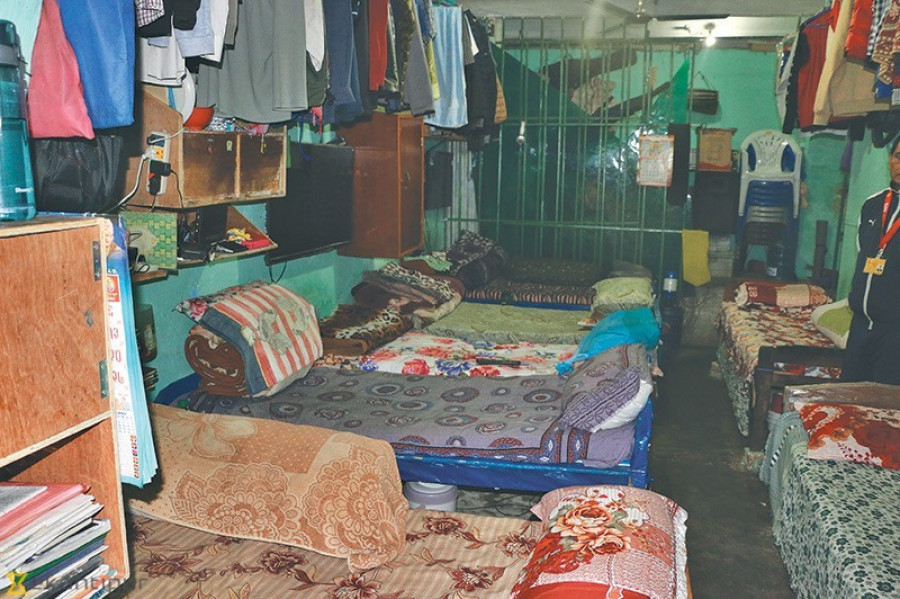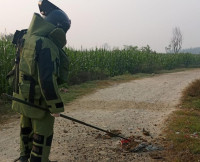National
Overcrowded prisons pose challenge for keeping inmates safe
A monitoring team by the National Human Rights Commission finds most of the convicts are vulnerable to coronavirus infection.
Binod Ghimire
As the cases of coronavirus are increasing at a rapid pace, keeping inmates safe in overcrowded prisons has become a challenge.
There are 71 prisons across the country and they have 24,700 convicts. The combined prisoner capacity of these prisons is only 16,000. With the country’s prison system stretched more than 50 percent beyond its capacity, there is a high risk of the coronavirus spreading among the inmates.
The latest Covid-19 test report released by the Department of Prison Management just goes to show that.
According to the department, 757 among the 1,929 prisoners in 17 prisons in different parts of the country who underwent real time polymerase chain reaction tests have tested positive for the infection. The test subjects were selected based on symptoms and contact tracing approach.
The department also said that eight prisoners have died of Covid-19 so far.
On September 21, the National Human Rights Commission had urged the government to become sensitive towards protecting the prisoners’ right to live in a safe environment amid growing number of Covid-19 cases among inmates.
The national rights watchdog had also formed a team to monitor the prisons in all seven provinces.
The team, led by the commission member, Sudip Pathak, that monitored 27 prisons found that the prisoners were highly vulnerable to coronavirus infection. With this finding, the team had recommended that the government take a serious step towards keeping the inmates safe before the situation turns worse.
“The prisons are so poorly managed that the inmates in most of them are prone to get infected,” Pathak told the Post. “The overcrowded facilities mean that the prisoners cannot maintain physical distancing.”
The Pathak-led team also found that most of the prisons didn’t have dedicated quarantine and isolation centres.
One does not have to go far to see the woeful prison condition of Nepal. The Central Jail in Kathmandu is holding 3,100 prisoners against its capacity of 1,400.
Pathak said the issue of overcrowded prison amid the Covid-19 pandemic continues despite the Supreme Court’s directive to the government to either release or reduce the sentences of some inmates.
The court had issued two directives in March and September ordering the government to reduce the number of prisoners amid the pandemic.
Stating that overcrowded prison facilities were violating the right to health of inmates, the apex court had ordered the authorities to seek alternative ways of penalising those behind bars.
The Parliamentary Law, Justice and Human Rights Committee had also issued a separate directive to the government to minimise the number of prisoners through a policy decision to ensure proper management of the country’s prison system during the pandemic.
Section 155 of the 2017 Criminal Code allows authorities to release inmates sentenced for up to a year by converting their jail terms into fines.
“Reducing the number of jailbirds as per the court’s directive is necessary if arranging adequate spaces for them is not possible,” Pathak said. “The lack of precautions could invite the situation just like in Siraha prison.”
Among the 587 prisoners in Siraha 514 had tested positive for the coronavirus.
The government officials agree that the lack of adequate infrastructure has created problems in keeping the prisoners safe.
“We are committed to maintaining maximum precautions in prisons despite poor infrastructure,” Dorna Pokharel, director General at Department of Prison Management told the Post. “I believe the Covid-19 situation in prison facilities is largely under control.”
Pokharel also claimed that quarantine and isolation centres have been set up in most of the prisons for new inmates and those who have to be taken out for court hearings and treatments.
Besides, he added, the prisons have also halted visit days as a preventive measure against the coronavirus spread among prisoners.
Meanwhile, the prison department has also been transferring inmates in overcrowded facilities to other prisons.
“We have so far transferred the prisoners in Syangja to Tanahun and those in Khotang to Udayapur. We plan to adopt this approach for other prisons as well,” Pokharel said.
The transferral of prisoners, however, is not going to solve the problem of overcrowded prisons in the country.
“Poor infrastructure remains a major challenge. We haven’t been able to do enough because we haven’t been able to expand or improve our prison facilities,” Pokharel said.




 24.09°C Kathmandu
24.09°C Kathmandu















